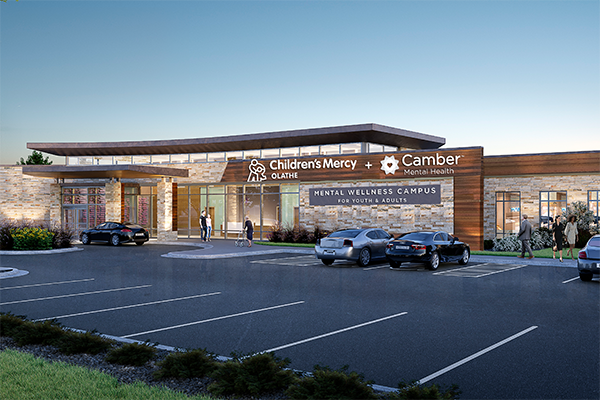- Locations
- How We Help
Overview
As the regional leader in youth mental health treatment, our innovative services help youth achieve health and wellness.
Treatment Programs
- Admissions
Overview
Learn how to admit your child to a Camber treatment location or make a client referral.
- Youth Disorders
- Resources
Overview
Our free resources help you stay informed and educated about mental health, brain development, and childhood trauma as well as how Camber is working toward building healthier communities.
- About Us
Overview
Our philosophy is to provide collaborative, compassionate and effective care through the use of timely, individualized treatment planning.
Learn More About Us
Depression
 We all experience times in our lives when we feel sad or unhappy. That is part of experiencing ups and downs throughout life and a natural response in certain situations. But when these feelings grow so strong that they feel unmanageable and/or last for long periods of time, the person experiencing them might be struggling with depression.
We all experience times in our lives when we feel sad or unhappy. That is part of experiencing ups and downs throughout life and a natural response in certain situations. But when these feelings grow so strong that they feel unmanageable and/or last for long periods of time, the person experiencing them might be struggling with depression.
This can become a serious condition that interferes with a person’s ability to live their day-to-day life and may require professional treatment and/or medication to stabilize and manage the symptoms.
Types of Depression
The most common types of depression that we diagnose and treat in the children and teens we serve include:
- Major depressive disorder
- Persistent depressive disorder
- Bipolar depression
- Seasonal affective disorder
- Atypical depression
Signs and Symptoms
It can be difficult for a child to understand and explain what they are feeling so it’s very important for caregivers to pay close attention to behaviors. Below is a list of behaviors that may indicate a child or teen is struggling with depression.
- Talking about feelings of hopelessness or worthlessness
- Changes in eating habits (such as eating a lot more or a lot less)
- Changes in sleeping habits (such as sleeping more, insomnia or frequent bad dreams)
- Difficulties concentrating, forgetfulness
- Complaints of stomach or body aches that aren’t due to a physical problem
- Increased anxiousness, sadness, irritability, anger or aggression
- Withdrawing from family and friends
- Avoiding activities enjoyed in the past
- Crying a lot more than usual
- Returning to outgrown behaviors (such as thumb-sucking or bedwetting)
- Poor school performance, avoiding schoolwork or skipping school or other activities
What You Can Do to Help
If you know a child who is struggling with depression, here are some ways you can support them:
- Seek professional help. It’s important to have a physician or licensed mental health professional examine the child for an accurate assessment and diagnosis of their physical and mental health.
- If the child expresses thoughts of suicide, call 911 immediately. Take these symptoms very seriously and get them professional help as soon as possible.
- Speak to their teachers and school counselors to ensure they know that the child may need additional support at school.
- Encourage the child to exercise or do physical activities they enjoy. Regular exercise can help with depression and promote better sleep.
- Be observant of their behaviors and help them keep track of when feelings of depression occur. Tracking this over time can help identify triggers, what treatment approaches are most effective or any additional concerns.
- Create a safe space where they feel they can openly share. Encourage frequent, honest conversations. Ask them how they’re feeling and allow them the time and space to open up as they’re ready. Just letting them know you are there for them to have a judgment-free conversation will build trust.

Camber Children’s Mental Health Can Help
Camber is a network of nonprofit children’s mental health hospitals and residential treatment centers serving youth ages 6 to 18. Each year, we give thousands of youth a safe place to heal, build resilience, and overcome struggles with mental health conditions. Our compassionate team of psychiatric, medical and behavioral health professionals provides a nurturing and therapeutic experience along with a treatment plan tailored to meet each child’s individual needs. The goal of our treatment programs is for each child to safely return home with the resources and supports in place to live a healthy and happy life in their community.
If you’re concerned that a child in your care is struggling with depression or other mental health needs, call Camber at 913-890-7468. We’re available 24/7 to answer your questions.
Here are some Camber resources to help you understand and cope with depression:
- Take this quick assessment to determine if your child might be struggling with depression
- Watch a recorded webinar about depression diagnosis, care and treatment [VIDEO]
- Use art to encourage the whole family to talk about their emotions [VIDEO]
- Get more info on mood disorders like major depression, bipolar disorder and more
- Learn common mental health warning signs to watch out for
- See how daily gratitude practice can improve mental health [VIDEO]
- Learn how psychiatric medication and therapy can be combined to treat depression
- Nourish your mind and body with this easy homemade granola recipe [VIDEO]
Here’s a list of additional resources you can contact for help:
- Call the child’s primary care physician or your local community mental health center
- Visit the Anxiety & Depression Association of America website at adaa.org
- Text HOME to 741741 for 24/7 support from the Crisis Text Line
- Call the National Alliance on Mental Illness helpline at 800-950-6264 or visit their website at nami.org
- Call the 988 Suicide and Crisis Lifeline at 988 or 988lifeline.org
- Learn more about depression from the Child Mind Institute
Share this information with your support system! View and download this information as a PDF.






